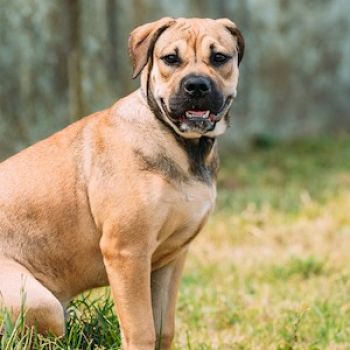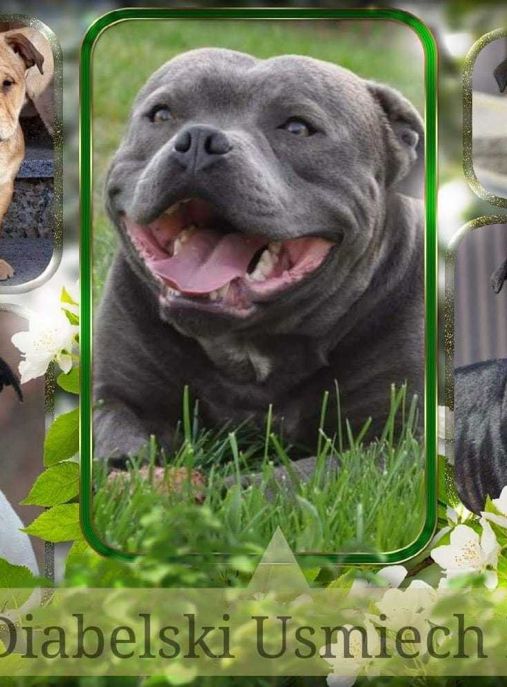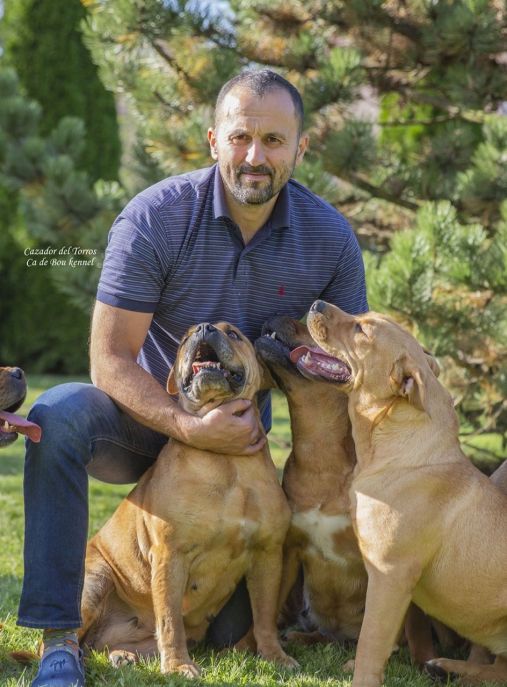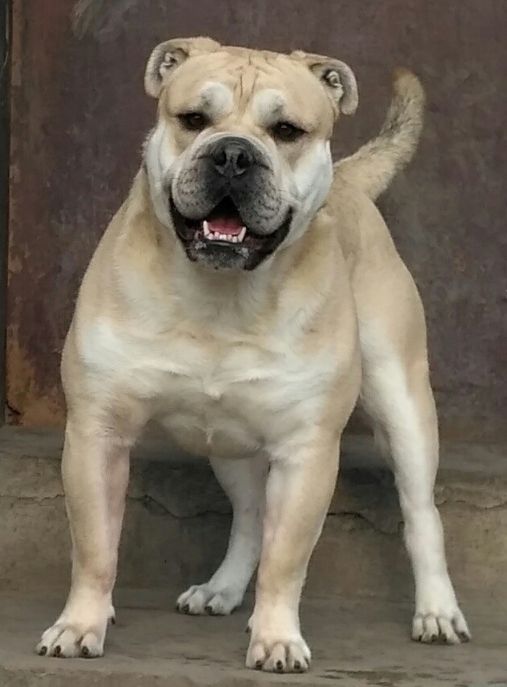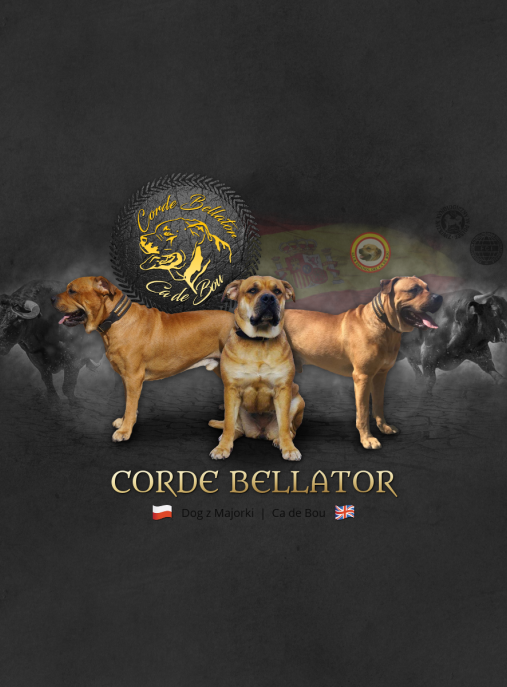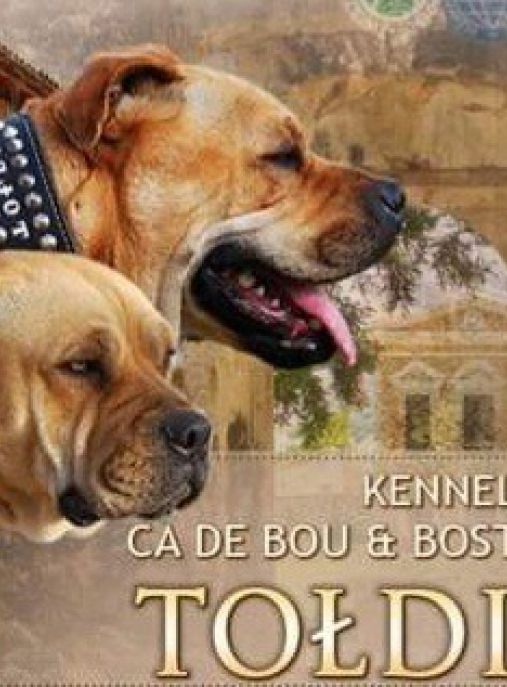The Majorca Mastiff, also known as the Ca de Bou or Perro de Presa Mallorquin, is a powerful and robust dog breed that hails from the beautiful island of Majorca, Spain. This breed is highly regarded for its strength, loyalty, and protective nature. With a rich history and remarkable physical attributes, the Majorca Mastiff has gained popularity not only as a working dog but also as a beloved family companion.
The history of the Majorca Mastiff can be traced back several centuries. It is believed that this breed descended from ancient Molossian dogs, which were renowned for their strength and courage. The Majorca Mastiff was primarily developed for various purposes, including guarding livestock, hunting wild boar, and participating in dog fights. Over time, these dogs became an integral part of the Majorcan culture and were highly valued for their versatility and reliability.
According to the FCI (Fédération Cynologique Internationale) typology, the Majorca Mastiff belongs to Group 2: Pinscher and Schnauzer - Molossoid breeds - Swiss Mountain and Cattle Dogs. Within this group, it falls under Section 2.1: Molossoid breeds, Mastiff type. This classification highlights the breed's strong and muscular build, as well as its historical connection to the Molossian dogs.
The Majorca Mastiff is known for its protective nature, making it an excellent guard dog. These dogs are fiercely loyal to their families and will go to great lengths to protect them. However, they require proper socialization and training from an early age to ensure they develop into well-rounded and obedient companions. Due to their strong prey drive and natural instincts, it is important to provide them with appropriate outlets for their energy and mental stimulation.
In terms of physical characteristics, the Majorca Mastiff is a large and imposing breed. Males typically stand between 23.5 to 25.5 inches (60-65 cm) at the shoulder, while females are slightly smaller, ranging from 22 to 24 inches (56-61 cm). The breed's weight varies between 77 to 99 pounds (35-45 kg) for males and 66 to 88 pounds (30-40 kg) for females. Their muscular bodies, broad chests, and strong bone structure contribute to their overall power and agility.
The Majorca Mastiff has a distinctive appearance, characterized by a large head with a square-shaped muzzle and a strong jaw. Their eyes are medium-sized and usually dark in color, while their ears are set high and can be cropped or left natural. The breed's coat is short, dense, and rough to the touch, providing protection against various weather conditions. The most common coat colors include fawn, brindle, and black, often with white markings on the chest and feet.
In terms of temperament, the Majorca Mastiff is known for its calm and balanced nature. While they are generally reserved and aloof with strangers, they are extremely affectionate and loyal towards their family members. Early socialization is crucial to ensure they are comfortable and well-behaved in different situations. With proper training and guidance, they can coexist peacefully with other animals and children.
The Majorca Mastiff has a relatively long lifespan compared to other large breeds, typically ranging from 10 to 12 years. However, like many large dogs, they may be prone to certain health issues, including hip dysplasia, elbow dysplasia, and gastric torsion. Regular exercise, a balanced diet, and routine veterinary care are essential to maintain their overall health and well-being.
One interesting fact about the Majorca Mastiff is its historical association with bullfighting. In the past, these dogs were used to control and subdue bulls during bullfighting events. Their strength, agility, and fearless nature made them well-suited for this task. However, with the banning of bullfighting in many countries, the Majorca Mastiff's role has shifted to that of a loyal companion and guardian.
In conclusion, the Majorca Mastiff is a remarkable breed with a rich history and exceptional physical attributes. Their strength, loyalty, and protective nature make them well-suited for various roles, including guarding, hunting, and serving as a devoted family companion. With proper training, socialization, and care, the Majorca Mastiff can thrive in a loving and responsible environment, bringing joy and companionship to its owners for many years.
The Majorca Mastiff, also known as the Ca de Bou or Mallorquin Mastiff, is a powerful and majestic breed that originated in the Balearic Islands of Spain. These dogs possess a unique character that sets them apart from other breeds. With their strong and imposing appearance, they are often misunderstood as aggressive or dangerous. However, beneath their tough exterior lies a loyal, intelligent, and gentle companion.
Majorca Mastiffs are known for their calm and confident demeanor. They have a natural instinct to protect their family and property, making them excellent guard dogs. Their imposing size and muscular build make them an intimidating presence, but their true character shines through when they are properly trained and socialized.
When raised in a loving and nurturing environment, Majorca Mastiffs are incredibly affectionate and devoted to their families. They form strong bonds with their owners and are known to be excellent with children. Their patient and tolerant nature make them a great choice for families with young kids. However, it is important to supervise interactions between the dog and children to ensure everyone's safety.
While Majorca Mastiffs are generally friendly and gentle, they can be wary of strangers. Early socialization is crucial to help them develop a balanced temperament. Exposing them to various people, animals, and environments from a young age will help them become well-rounded and confident adults. It is essential to teach them proper behavior and manners to prevent any potential aggression or fearfulness.
Training a Majorca Mastiff requires a firm and consistent approach. They are intelligent dogs that respond well to positive reinforcement techniques. Harsh training methods or punishment can lead to a negative impact on their temperament. Early obedience training is essential to establish boundaries and ensure they grow into well-behaved adults.
Exercise is crucial for Majorca Mastiffs to maintain their physical and mental well-being. They have a moderate energy level and require daily walks, playtime, and mental stimulation. Engaging them in activities like obedience training, agility, or even scent work can help keep their minds sharp and prevent boredom.
Majorca Mastiffs are generally healthy dogs, but like any breed, they can be prone to certain health issues. Regular veterinary check-ups, a balanced diet, and proper exercise are essential for their overall health and longevity.
In conclusion, the Majorca Mastiff is a breed with a unique character. While they may appear intimidating, they are loving, loyal, and gentle with their families. Early socialization, proper training, and regular exercise are key to raising a well-rounded and happy Majorca Mastiff. With the right care and attention, these magnificent dogs can make wonderful companions and guardians for the right owner.
The Majorca Mastiff, also known as the Ca de Bou, is a powerful and majestic breed that requires specific care to ensure their well-being and happiness. Here are some tips on how to care for Majorca Mastiff dogs, including what to do and what not to do:
1. Provide Proper Exercise: Majorca Mastiffs are active dogs that require regular exercise to maintain their physical and mental health. Daily walks, playtime, and interactive toys are essential to keep them stimulated. However, avoid excessive exercise, especially during hot weather, as they are prone to overheating.
2. Balanced Diet: Feed your Majorca Mastiff a high-quality, balanced diet that meets their nutritional needs. Consult with a veterinarian to determine the appropriate portion sizes and frequency of meals. Avoid overfeeding, as this breed is prone to obesity, which can lead to various health issues.
3. Grooming Routine: Majorca Mastiffs have a short, dense coat that requires minimal grooming. Regular brushing helps to remove loose hair and keep their coat healthy. Additionally, check their ears regularly for any signs of infection and trim their nails as needed.
4. Socialization and Training: Early socialization is crucial for Majorca Mastiffs to ensure they grow up to be well-rounded and friendly dogs. Expose them to various people, animals, and environments from a young age. Enroll them in obedience training classes to establish good behavior and strengthen the bond between you and your dog.
5. Provide Mental Stimulation: Majorca Mastiffs are intelligent dogs that thrive on mental stimulation. Engage them in puzzle toys, obedience training, and interactive games to keep their minds active. Mental stimulation helps prevent boredom and destructive behavior.
6. Regular Veterinary Check-ups: Schedule regular visits to the veterinarian for routine check-ups, vaccinations, and preventive care. Majorca Mastiffs are prone to certain health issues, such as hip dysplasia and heart conditions. Early detection and treatment can significantly improve their quality of life.
7. Provide a Safe Environment: Ensure your home and yard are secure and free from hazards. Majorca Mastiffs are strong and can be protective, so proper fencing is essential to prevent them from wandering off or getting into trouble. Keep toxic substances, sharp objects, and small items out of their reach.
8. Avoid Harsh Training Methods: Majorca Mastiffs respond best to positive reinforcement training methods. Use rewards, praise, and treats to motivate and encourage good behavior. Avoid harsh corrections or punishment, as it can lead to fear or aggression in this sensitive breed.
9. Be Mindful of Heat and Cold: Majorca Mastiffs have a low tolerance for extreme temperatures. During hot weather, provide shade, fresh water, and avoid exercising them during the hottest parts of the day. In cold weather, provide a warm shelter and consider using doggy clothing to keep them comfortable.
10. Show Love and Affection: Majorca Mastiffs are loyal and devoted companions. Show them love, attention, and affection to strengthen your bond. Spend quality time with them, provide regular exercise, and include them in family activities.
Remember, every dog is unique, and individual care requirements may vary. It's important to observe your Majorca Mastiff's behavior, monitor their health, and consult with a veterinarian for personalized advice. With proper care, love, and attention, your Majorca Mastiff will thrive and bring joy to your life.
The Majorca Mastiff, also known as the Ca de Bou or Mallorquin Mastiff, is a majestic and powerful breed that originates from the island of Majorca, Spain. One of the distinguishing features of this breed is its unique and captivating coat color.
The common color of Majorca Mastiff dogs is a rich and deep shade of brindle. Brindle refers to a pattern of dark stripes or streaks that are overlaid on a lighter background color. In the case of the Majorca Mastiff, the background color is typically a warm and earthy tone, ranging from a light fawn to a deep reddish-brown.
The brindle pattern on the Majorca Mastiff's coat is truly striking. The dark stripes are usually black or a dark brown, creating a beautiful contrast against the lighter background color. These stripes can vary in width and intensity, giving each dog a unique and individual appearance. Some Majorca Mastiffs may have a more pronounced brindle pattern, with bold and defined stripes, while others may have a more subtle and blended pattern.
The brindle coloring of the Majorca Mastiff serves both a functional and aesthetic purpose. In terms of functionality, the brindle pattern helps to camouflage the dog in its natural environment. This was particularly important in the breed's history when they were used as working dogs, guarding livestock and properties. The brindle coat allowed them to blend in with their surroundings, making them more effective in their duties.
From an aesthetic standpoint, the brindle coloring of the Majorca Mastiff is undeniably eye-catching. It adds depth and dimension to the dog's appearance, making it stand out in a crowd. The combination of the warm background color and the dark brindle stripes creates a visually appealing contrast that is often admired by dog enthusiasts.
It is worth noting that while brindle is the most common color for Majorca Mastiffs, there can be some variations within the breed. Some individuals may have a solid coat color, such as fawn or black, without any brindle markings. However, these variations are less common and do not detract from the breed's overall beauty and appeal.
In conclusion, the common color of Majorca Mastiff dogs is a captivating brindle pattern. This unique coat color, with its dark stripes overlaying a warm background, adds to the breed's majestic and powerful appearance. Whether working in the field or simply being admired as a companion, the brindle coat of the Majorca Mastiff is truly a sight to behold.
The Majorca Mastiff, also known as the Ca de Bou, is a robust and powerful breed of dog originating from the island of Majorca, Spain. These dogs have a strong and muscular build, with a broad head and a thick, short coat. Despite their imposing appearance, Majorca Mastiffs are generally healthy dogs with a relatively low incidence of breed-specific health issues. However, like any other breed, they are still prone to certain common ailments that owners should be aware of.
One of the most common health issues seen in Majorca Mastiffs is hip dysplasia. This is a genetic condition where the hip joint does not develop properly, leading to pain, lameness, and arthritis. Regular exercise, a balanced diet, and maintaining a healthy weight can help reduce the risk of hip dysplasia. Additionally, responsible breeders should conduct hip evaluations on their breeding dogs to minimize the occurrence of this condition.
Another health concern in Majorca Mastiffs is entropion, a condition where the eyelids roll inward, causing the eyelashes to rub against the cornea. This can lead to irritation, corneal ulcers, and even vision loss if left untreated. Regular eye examinations by a veterinarian can help detect and address entropion early on. In severe cases, surgical correction may be necessary.
Gastric dilatation-volvulus (GDV), commonly known as bloat, is a potentially life-threatening condition that can affect Majorca Mastiffs. It occurs when the stomach fills with gas and twists on itself, cutting off blood supply and causing severe pain. Symptoms include restlessness, unproductive retching, and a distended abdomen. Immediate veterinary attention is crucial in these cases, as GDV requires emergency surgery to correct.
Like many large breeds, Majorca Mastiffs are also prone to certain cardiac conditions, such as dilated cardiomyopathy (DCM). DCM is a disease that affects the heart muscle, leading to an enlarged and weakened heart. Regular veterinary check-ups, including cardiac evaluations, can help detect early signs of DCM. A balanced diet rich in essential nutrients, regular exercise, and avoiding excessive stress can help maintain heart health in these dogs.
To ensure the overall health and well-being of Majorca Mastiffs, regular veterinary care is essential. This includes routine vaccinations, parasite prevention, and dental care. Regular exercise is also crucial to keep these dogs physically and mentally stimulated. However, it is important to avoid excessive exercise, especially during the growth phase, as it can put strain on their developing joints.
Proper nutrition is vital for the health of Majorca Mastiffs. A high-quality, balanced diet that meets their specific nutritional needs is recommended. Feeding them a diet appropriate for their age, size, and activity level can help prevent obesity, which can exacerbate joint issues and other health problems.
In conclusion, Majorca Mastiffs are generally healthy dogs with a relatively low incidence of breed-specific health issues. However, responsible ownership and regular veterinary care are crucial to ensure their well-being. By being aware of the common health concerns and taking appropriate preventive measures, owners can help their Majorca Mastiffs live long, healthy lives.
The Majorca Mastiff, also known as the Ca de Bou, is a powerful and robust breed originating from the island of Majorca, Spain. These dogs have a muscular build and a strong protective instinct, making them excellent guard dogs. To ensure their overall health and well-being, it is crucial to provide them with a balanced and nutritious diet. Here is an extensive description of the nutrition requirements for Majorca Mastiff dogs, along with advice on feeding and what to avoid.
Protein is a vital component of a Majorca Mastiff's diet, as it helps in muscle development and repair. High-quality animal-based proteins such as chicken, beef, fish, and lamb should form the foundation of their meals. These proteins are rich in essential amino acids, which are necessary for the proper functioning of their body.
In addition to protein, Majorca Mastiffs require a moderate amount of healthy fats. Fats provide energy, aid in nutrient absorption, and support the health of their skin and coat. Sources of healthy fats include fish oil, flaxseed oil, and chicken fat. It is important to note that excessive fat intake can lead to obesity, so portion control is crucial.
Carbohydrates are another essential component of a Majorca Mastiff's diet, providing them with energy. However, it is important to choose complex carbohydrates that are rich in fiber, such as whole grains, sweet potatoes, and vegetables. These carbohydrates help regulate blood sugar levels and promote digestive health.
Feeding a Majorca Mastiff should be done in accordance with their age, weight, and activity level. Puppies require more frequent meals, typically three to four times a day, while adult dogs can be fed twice a day. It is important to establish a feeding schedule and stick to it, as it helps regulate their metabolism and prevents overeating.
Portion control is crucial to prevent obesity, which can lead to various health issues. Majorca Mastiffs have a tendency to overeat, so it is important to measure their food accurately and avoid free-feeding. Consult with a veterinarian to determine the appropriate portion size based on your dog's specific needs.
While providing a balanced diet is essential, it is equally important to avoid certain foods that can be harmful to Majorca Mastiffs. Some foods that should be avoided include chocolate, caffeine, grapes, raisins, onions, garlic, and avocados. These foods can be toxic to dogs and may cause severe health issues.
Additionally, it is important to avoid feeding your Majorca Mastiff table scraps or excessive treats. Human food is often high in salt, sugar, and unhealthy fats, which can lead to obesity and other health problems. Stick to a high-quality commercial dog food or consult with a veterinarian to create a balanced homemade diet.
Lastly, always ensure that your Majorca Mastiff has access to fresh and clean water throughout the day. Hydration is crucial for their overall health and helps regulate body temperature.
In conclusion, providing a Majorca Mastiff with a balanced and nutritious diet is essential for their overall health and well-being. Focus on high-quality proteins, moderate amounts of healthy fats, and complex carbohydrates. Establish a feeding schedule, practice portion control, and avoid harmful foods. By following these guidelines, you can ensure that your Majorca Mastiff remains healthy, happy, and full of vitality.

